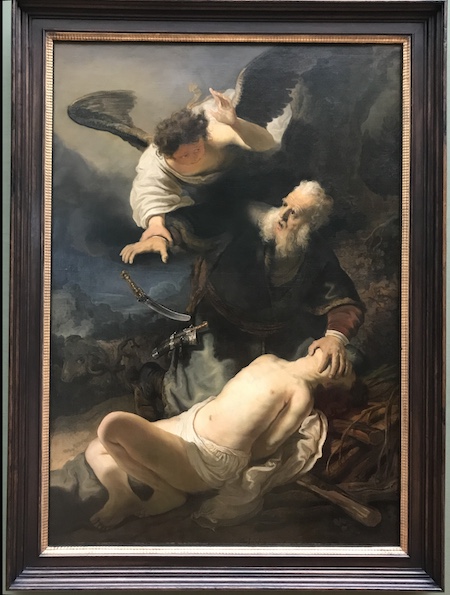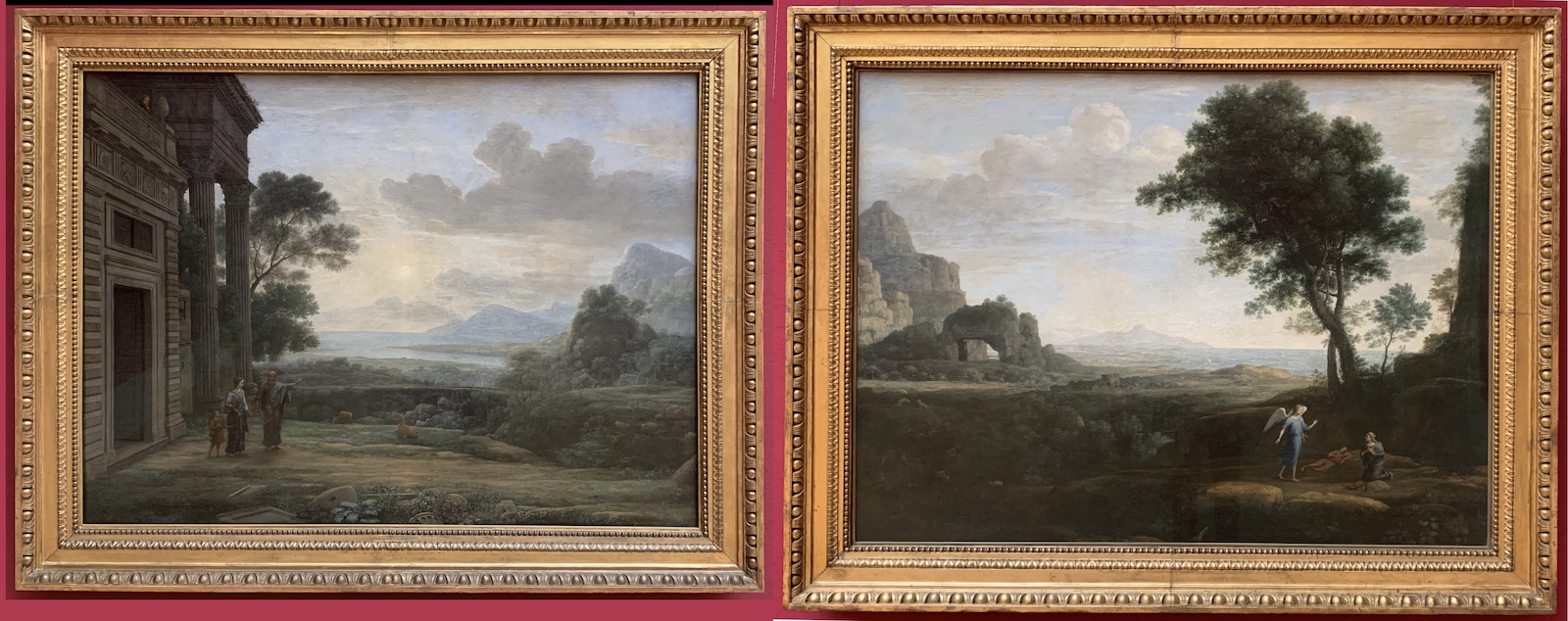“Ein jeder muß ein inneres Heiligthum haben dem er schwört, und wie jener Fahnenjunker sich als Opfer in ihm unsterblich machen – denn Unsterblichkeit muß das Ziel sein.”
Every one must swear to something sacred within him, and, like that ensign, make himself immortal by sacrificing his life for it; because Immortality must be the aim
Bettina von Arnim, Die Günderode. Translated by Margret Fuller.
Have you suffered, starved and triumphed,
groveled down, yet grasped at glory,
Grown bigger in the bigness of the whole?
“Done things” just for the doing, letting babblers tell the story,
Seeing through the nice veneer the naked soul?
Have you seen God in His splendors,
heard the text that nature renders?
(You’ll never hear it in the family pew).
The simple things, the true things, the silent men who do things —
Then listen to the Wild — it’s calling you.Robert Service, Call of the Wild
Opfer, the German word for sacrifice has another, much more common meaning: In German, Opfer firstly means victim, someone to whom damage happens, who is subject to an accident, a fatality in the extreme. The Latin differentiates sacrificium from this second meaning, victima, and English follows the Latin accordingly. Even with this difference, the meaning of to sacrifice, being a victim, or even becoming a casulty are not completely independent from each other: Those who sacrifice themselves often draw others with them, and makes them into victims.
The biblical story of Abraham, progenitor of Jews, Christians, and Muslims, gives the archetype of such double-faced sacrifice: The father who in his view is going to sacrifice the most valuable he has, by actually forcing his son to give the ultimate sacrifice. His relentnesness in pursuing his goal matches the inconsideration of his fellow-human’s goals. It is interesting to note here, that in the Hebrew text God’s command and Abraham allows for an alternative tranlation. The imperative וְ/הַעֲלֵ֤/הוּ may mean “offer him” but also “make him offer”. Although the sacrifice humain has since Abraham’s times become mostly metaphorical, the damage that those sacrifices might impose onto us can still be considerable. (To be precise, the afore mentioned sacrifice is already the second in Abraham’s story - he had earlier sent Hagar, his wife’s handmaiden, into the desert to perish, together with Ishmael, his first son she had born him).

Rembrandt. Abraham’s Sacrifice. 1636, Alte Pinakothek, München.
The modern day version of the sacrifice is strive, ambition. Ernest Shackleton’s journey to the South Pole, full of privation, gives a great example about what Brecht sings in his ballad “The Secret of Gracious Living” from the Threepenny Opera: “Those brave adventurers whose quaint addiction, Is Truth and Freedom in and out of season, And risking their own necks for no good reason.” … our culture favours this sacrifice for a higher goal as male role model. In contrast to loving dedication which (as most parents may confirm) is undivisibly linked to family, real men sacrifice themselves with grand gesture, for posterity, for the people, or for their ideas of society. Be it the journey to the South Pole or the Last Stand at the front-while men offer themselves as sacrifice to the higher good, their heroism leaves usually victims left and right, however, those don’t sacrifice, those are casulties. After all, Shackleton didn’t go to Antarctica on his own, and had left his family at home, too.
The price others pay for our sacrifices is often higher than what we ourselves are willing to drop into the offering box. And we don’t just expect these double-sacrifices from men. If women want to be part of the game, they have to be ready to be hard not only on themselves, but also on their family.
What values do people hold who put their own striving above the happiness of others?
If we are not conscious of fame in sleep which is most like death, shall we be conscious of it in death, which is an eternal sleep? […] Today we die; silence descends upon us tomorrow. […] Having borne so much, spent so many sleepless nights, done so much, and not having taken refuge even from death, do you conceive the hope of being in men’s mouths in the future, when you see that even kings and greatest princes have been expelled into an eternal obscurity of silence? Tell me, please, who was the fifth, the fourth, the third ruler of the Romans? Ask the man in the street. He can’t even tell you the second, or if one in ten thousand may know this information, he will recall it as if from as something that he never thinks about. Lorenzo Valla, De vero falsoque bono, translated by A. K. Hieatt and M. Lorch
There is no good above friendship, writes Cicero on the core of Epicurius teaching. And as Valla draws out in his humanistic philosophy of hedonism, beauty and happiness are equivalent with honour and dignity, and it is only an illusion that makes us not identify these topics.
Latenter esse vivendum – live unnoticed! is what Plutarch conveyed to us as Epicurus’ rule for a happy and good life. Thus, there ends career, candidacy for office, striving for political mandate.
Live joyfully with the wife whom thou lovest all the days of the life of thy vanity, which he hath given thee under the sun, all the days of thy vanity: for that is thy portion in this life, and in thy labour which thou takest under the sun. Whatsoever thy hand findeth to do, do it with thy might; for there is no work, nor device, nor knowledge, nor wisdom, in the grave, whither thou goest. (Eccl 9,7-10)
The Secret of Gracious Living
(Brecht, The Threepenny Opera)
Great praise is always lavished on great thinkers
Who think of books (but do not think of dinner)
In some old shack where even rats grow thinner -
I can’t abide such solitary stinkers !
For Simple Living simply does not pay
And I’d be glad to hear last of it.
From here to Rome no turtle-dove or tit
Would live on such a menu for one day.
Let ’em keep their freedom!
Let ’em keep their fleas
Only the well-to-do can live at ease.
Those brave adventurers whose quaint addiction
Is Truth and Freedom in and out of season
And risking their own necks for no good reason
(Materials for adventurous non-fiction):
See how they waste the wintry evenings napping
Then silently with wintry wife to bed
Their solemn thoughts three thousand years ahead
And both their ears agog for cheers and clapping!
Let ’em keep their bravery! Fve a better wheeze:
None but the well-to-do can live at ease.
In spring I ask: could there be something to it?
Could not Macheath be great and solitary?
But then the year works round to January
And I reply: My boy, you’ll live to rue it.
Poverty makes you sad as well as wise
And bravery mingles danger with the fame.
Poor, lonely, wise and brave - in heaven’s name!
Goodbye to greatness! I return the prize
With this my repartee of repartees:
None but the well-to-do can live at ease.
Note: I wrote this post originally in German. Starting with the biblical book Ecclesiastes (Qohelet) I would come to Epicureanism via Lorenzo Valla. You may find other posts on Epicureanism under this tag: /tag/epicureanism.
